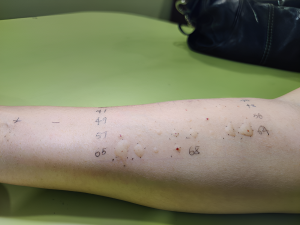ALLERGY DIAGNOSIS AND IMMUNOTHERAPY
3 different tests help us understand what exactly you are allergic to. You would easily tell us that you are allergic to dust – but did you know that dust is an extensive term? It includes dust mites, cockroach dust, road dust, wheat dust, rice dust, sawdust, cotton dust and so on.
While some of these are more likely irritants than allergens, it is imperative to identify the exact allergen (or protein) that causes the symptoms in you. For this, we have 3 tests available.
- Skin Prick Allergy Test
- Comprehensive Blood Allergy Profile
- Component Resolved Diagnosis (CRD)
Let’s now understand what these tests are and which of these is the ideal one for you.
SKIN PRICK ALLERGY TEST
Here we place a drop of each allergen (food, contact, dust, pollen, moulds or arthropods) on the skin of your forearm and prick with a tiny thin needle. It is not painful, we have successfully done the test in innumerable children, some even less than 10 years of age. Within minutes the area around the prick will swell up with mild redness if you are allergic to the protein. Regarded as the gold standard test, this helps us demonstrate a small reaction on your forearm, akin to the response inside your respiratory and digestive tracts when inhaling or ingesting the allergen.

The only caveat is that you shouldn’t have taken any medicine that may interfere with the test. The test is done by ENT consultants of Dr. Hans’ team who have had special training in the field of allergy. Talk to us if you wish to know more about this test. The test has revolutionised our practice and brought excellent results in sinusitis, allergic rhinitis, snoring, sleep apnoea, lump sensation in the throat, recurrent ear infections, fluid inside the ears and more.
The treatment becomes more decisive once we know what you are allergic to. The benefits you get will be long-lasting. Moreover, you can be rid of constant anti-allergics.
This is how your forearm will look if you are allergic. The bumps will go off within half an hour leaving no marks.
COMPREHENSIVE BLOOD ALLERGY PROFILE
This test is a simple blood test that checks for preformed antibodies against various allergens in your blood. The test doesn’t check for bound antibodies unlike the skin prick test. However, this test is done in small kids (who may not tolerate skin prick testing) and those who cannot stop antiallergics or sleep medicines. Being a simple blood test, some frail individuals prefer this over skin prick testing. Although less accurate than skin prick testing, this is a valuable tool to diagnose allergies in patients.
The advantage of the test is that it can check for 100s of allergens in one prick itself. We can assess sensitivities to food, contact, inhalant and drug allergens. Our state of the art laboratory has this facility.
COMPONENT RESOLVED DIAGNOSIS
One of the most recent tests to diagnose allergies, it just doesn’t tell us what allergen you are sensitive to, but also tells us the exact component of the allergen that troubles you. Say, peanuts or grass may have different proteins which sensitise different individuals. CRD test can exactly point out which component it is.
CRD has changed the way we view allergies. Identifying the component is of high value in polysensitisation, oral allergy syndrome and conditions where there is a strong clinical suspicion of allergy but turns out negative in the standard tests.
CRD is also a blood test and the report is available in a few days time.
MANAGEMENT OF ALLERGIES – THE ROLE OF IMMUNOTHERAPY
Once the allergen is identified our professionals will discuss in detail about allergen avoidance. Their extensive counselling session will include details about the allergen, where they are found and how they impact you. They will specifically tell you avoidance measures pertinent to the allergen in the picture.
But how do we avoid dust mites, pollens and moulds? Yes, although we educate you about how to avoid them, considering we are living in a rapidly developing young nation, you have to take some additional measures so that you don’t react excessively to allergens. This involves getting desensitized to allergens that you test positive for. This therapy, termed Allergen Specific Immunotherapy is a very simple process. For a certain period of time we give you allergy drops (like polio drops) which go inside your system and make you tolerant to the allergen. It smartly educates your system to not be extra sensitive to these proteins, but helps preserve your immunity for more harmful agents like bacteria and viruses which cause diseases in you.
Talk to us about immunotherapy and whether you are a candidate for it. With successful immunotherapy, we have been able to avoid surgeries in many cases of sinusitis, sinonasal polyposis, nasal blockages, stuffed nose problems, recurrent tonsillitis and recurrent fluid in ears. We have a great track record in treating allergies and associated conditions with our adept professionals. We don’t just treat the condition, we identify the root cause and eradicate it, so that you have a long-lasting relief.
View this post on Instagram
View this post on Instagram
View this post on Instagram



